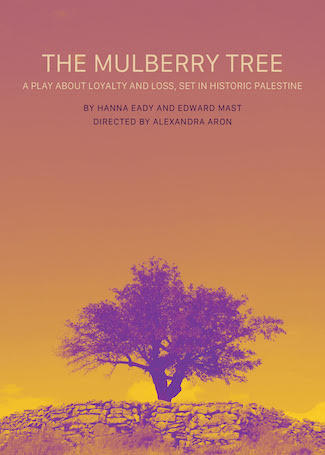The Mulberry Tree @ La MaMa
Marcus David
October 2024
The Mulberry Tree: A Play About Loyalty and Loss, Set in Historic Palestine
Directed by Alexandra Aron
Written by Hanna Eady and Edward Mast
“Despite the current circumstances, there was a time not too long ago in Palestine when Muslims, Jews, and Christians lived together in peace and harmony. My father, the late scholar Edward Said, was born in that place during that time. This play, grounded in history and truth, tells the story of two families whose deep, long-standing friendship is tested by the forces of politics and nationalism. As artists, I believe our role is to envision and create possibilities for the future, and often that requires a closer examination of both our humanity and our shared past. This play offers us the opportunity to do just that.”
— Najla Said, portraying Salma in The Mulberry Tree
The new season at La Mama made waves with a new offering titled The Mulberry Tree, Oct 10-20, a story of neighbors living together in a small village and desperately trying to maintain their friendship in the years leading up to the founding of Israel in 1948. The village Rabbi named Zakareeya, played by Khalifa Natour, is particularly close to a young Palestinian boy named Noor, played by Ramzi Khalaf, who lives in the house next door. Sadly, their relations become upset and finally impossible.
The presentation is quite simple with traditional costuming and minimal set design with the addition of some video projections. The story however is quite gripping and tense as it works to humanize the Palestinians and create a longing for justice. There are many gut-wrenching moments as the longtime neighbors react to the historical timeline of true to life events and try to manage the new lines and boundaries being drawn all around them. The conflict is further exasperated by an ever present outside power, the British, providing arms to one side. In light of the current situation with the Gaza War, The Mulberry Tree feels quite timely by showing us how these one-time close relationships have become completely derailed and now brutally violent.
The effect The Mulberry Tree has brings to mind the 1968 musical Hair, which happened to get its start in the New York experimental theatre scene of the east village before making it to the mainstream. The musical is credited with giving voice to its generation’s anti war sentiments, while also helping shape public opinion against the Vietnam war.
Columbia University‘s Rashid Khalidi, one of America’s foremost scholars of Palestine, has himself made the point that wars can end when public opinion turns against them and to demonstrate this he points to how the Vietnam war ended, which was not due to America losing the war on the battle field, but in fact came about when the American people became opposed to war. It should be noted that the musical Hair had a hand in shaping that opposition.
So theater can make a difference. Let’s hope that The Mulberry Tree can move on from La Mama and present its message to larger audiences and in doing so, change public opinion once again against war.
The cast includes Ramzi Khalaf (The Kite Runner, National Tour), Rachel Botchan (King of the Jews, Off-Broadway), Laith Zuaiter (TV: “Ramy”), Najla Said (Palestine, Off-Broadway), and Khalifa Natour (Grey Rock, The Band’s Visit, Tikkun), and Haythem Noor, (The Kite Runner, National Tour).
The play is produced for Loose Change Productions by John Breen. The production team includes Khalifa Natour (Dramaturgy), Izmir Ikbal (set design), Dina El-Aziz (costume design), Habib Hanna (composer), Amanda Baughman (sound design), Tal Yarden (projection design), Stephanie Klapper (casting), Eileen Haggerty (production stage manager) and Amanda Reynoso (assistant stage manager). Special thanks to the Sari-Sari Women of ColorArts Coup for their ongoing support of this production.
For more info on the La MaMa Experimental Theatre Club visit→
La MaMa Experimental Theatre Club is dedicated to the artist and all aspects of the theatre. Founded in 1961 by Ellen Stewart, La MaMa is a home for artists of all identities, races, ages, and cultures. At La MaMa, artists are provided the space, support, and creative freedom to explore new forms of expression and to make new work.La MaMa builds audiences that are integral to the creative process. Our local and global community members who gather in our physical, digital, and hybrid spaces to see new work, are often the first audience for that work. The audience response helps to shape the evolution of the piece for the artist, and is an essential part of the creative ecosystem that La MaMa nurtures.La MaMa believes art is a force for change. Violence, discrimination, and systemic racism will not stop without a unified resistance. La MaMa is committed to battling bigotry and intolerance in all its forms, and to providing inclusive spaces for our local, national, and global community.

